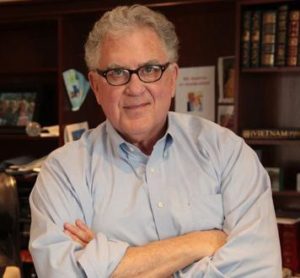Here’s some news before I get personal.
Congress is in recess as this issue of our newspaper goes to press. The president has signed into law the new PPP Extension Act – H.R. 1799 – which extends the program through May 31 of this year, yet the details of how the PPP is working (or not) are still anyone’s guess.
The bill allows loan applications to the program – which had

been set to expire March 31 – to be taken for two more months, and gives the SBA 30 additional days to process loan applications made by the new May 31 deadline.
Another provision in the bill may be a bit more troublesome for some of our state’s member banks that specialize in agriculture lending. It has to do with an agricultural debt-relief provision.
The so-called COVID relief measure includes an unrelated provision authorizing payments to certain farmers in an amount up to 120% of previously incurred farm-loan indebtedness for USDA direct or guaranteed loans. There’s a catch, however. The payments can only be to farmers considered “socially disadvantaged.”
“What does that mean?” you may ask. As I understand it, “socially disadvantaged” farmers are defined in law as “Black or African American, American Indians or Native Alaskans, Hispanics, Asians and Native Hawaiians or Pacific Islanders.” As I’ve been told, the bill would allow USDA “such sums as may be necessary” to pay off pre-existing loans.
The extra 20% is built in to enable these socially disadvantaged farmers to pay off any tax debt that might be incurred as a result of paying off the loan.
In 2019, the FSA had more than 6,500 outstanding loans with nearly $800 million in direct loans and guarantees to farmers classified as “socially disadvantaged.” This category of farmers make up just under 14% of the FSA’s $5.74 billion in outstanding loans overall.
I’m simply reporting the facts about some of the language contained in the bill. I have questions about its constitutionality (the equal protection clause) because those that sponsored the addition of this specific language did so to provide assistance to a group of rural farmer/borrowers because of the color of their skin, not because of the individual borrower’s needs.
Now, on to a more personal subject.
This is my last column for the Oklahoma Banker, as I prepare for retirement at the end of this month. I’ve been here for more than three decades (33 years to be exact), and I recognize it’s time to pass the torch of leadership to the next generation.
There are many whom I have already thanked for the opportunity that was given to me so very long ago. I have wonderful memories from my work with 33 different chairpersons and boards of directors, and I will continue to say “thanks” to those with whom I cross paths in the next chapter of my life.
To serve as your OBA’s president and CEO has been my dream job. I am so very grateful for the opportunity and the trust you placed in me to make your state bankers association among the very best in the nation.
I’m also a little anxious, primarily because I’ve been working at something since I was 8-years old. My dad retired and died. I’d rather not repeat that precedent. I’ll still be around to help banks in any way possible, but specifically to answer a very important question in this current environment: Is it time to sell the bank?
I believe very strongly in banks generally, and especially in community banks. I’ve seen how important you are to the communities you serve, up close and personal from my service as the state banking director in Nebraska so many years ago.
You are the economic engine for the communities you serve. You are the foundation on which your communities have been built. You make dreams come true for your customers. Don’t ever doubt or think otherwise about your bank’s significance. Without you, nothing happens.
As a boy, I remember Saturday mornings, fascinated by our new television set (we were one of the last families among my friends to have one), which let me watch one of my favorite shows, starring Roy Rogers. At the end of each show, while the credits were rolling, Roy and Dale (Evans) would sing a song appropriate here: “Happy Trails.” It began —
Happy trails to you, until we meet again.
Happy trails to, keep smiling until then.
Happy trails to you, ‘til we meet again.
I hate “goodbyes,” so I’ll just say, I wish you nothing but happiness going forward, that the Lord bless you and your families in boundless ways, and that you have “Happy Trails,” now and forevermore.
 Oklahoma Bankers Association We make bankers better!
Oklahoma Bankers Association We make bankers better!
